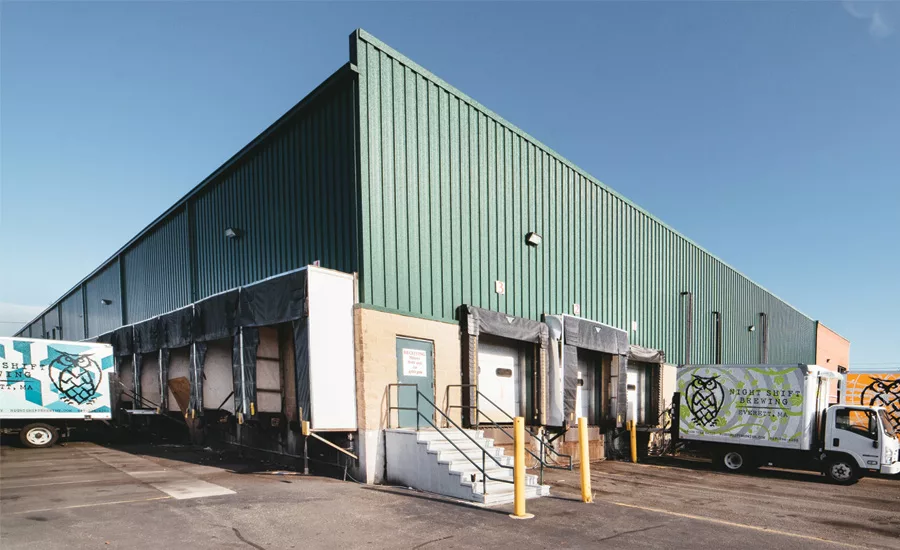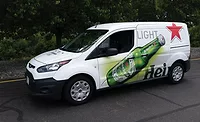Night Shift Distributing crafts a path across Massachusetts
Fleet company services 2,000 accounts throughout the state

Diversification has been a key path to success for many beverage operations in today’s ultra-competitive market. That’s been true for Boston’s Night Shift Brewing, which, in 2016, launched a separate distribution business. A year later, it diversified even more when it became the wholesaler for a number of other craft brewers. Then, it took a step further when it expanded beyond the beer category.
“We [initially] went into it thinking we were [just] a beer distributor,” says Night Shift co-founder and President Rob Burns. “[We said] ‘We were a brewery, we’re beer guys, we know beer, we know how to sell it, so let’s do beer only.’ But as we got into it, we saw that other kinds of small producers were having the same challenges.”
One of those producers was a distillery located about a block away from Night Shift’s headquarters. Burns recalls asking why the distiller’s spirits weren’t available in more retail accounts.
“They said, ‘We don’t’ want to work with big wholesalers because we’d never get their attention if they’re selling Tito’s Vodka by the truckload,” Burns recalls. “And we realized that if that was a pain point for other types of producers, we had the infrastructure so let’s apply our philosophy to other like-minded companies in other categories, add them to our trucks and go from there.”
Night Shift’s trucks are all refrigerated and includes eight Isuzu box trucks (with a ninth on the way) and a Sprinter Van. “[The Sprinter] is more for quick deliveries,” Burns notes. “We also have a pickup truck for events.”
The 16-foot box trucks are shorter than most wholesalers use, a necessity in a city as old as Boston with extremely narrow streets.
“Obviously parking tickets are a daily occurrence and that makes things challenging,” Burns laments. “And of course there’s the traffic.”
The distribution warehouse is in Chelsea, Mass., which connects to downtown Boston by a bridge only is a two-mile drive from point A to point B, but that could be a 30- or 40-minute ordeal at the busiest times.
The fleet services about 2,000 accounts across most of Massachusetts. “We go from the Interstate 91 corridor, Amherst, Northampton, then we go all the way out to the islands: Nantucket and Martha’s Vineyard,” Burns explains. The only slice of the state that Night Shift doesn’t reach is Berkshire County on the far western end of Massachusetts, bordering Upstate New York to the west and southwestern Vermont and northwestern Connecticut to the north and south, respectively.
“We are looking to be a whole-state solution,” Burns reveals. “There are some pretty good accounts up there, they’re just pretty far, making for a long day. It’s really about making sure that delivering the beverages is actually profitable for us. If we have to drive two hours to deliver one keg and drive two hours back we really don’t make any money.”
He’s hoping to eventually get a concentration of accounts in the region to ensure that there’s enough volume to justify the extensive treks. Getting to that point is a logical next step in Night Shift’s “concentric circles” market expansion strategy.
“[Those circles] have been spiraling out from Boston,” Burns says. “It makes sense to drive five miles out, then another five and add a few accounts. It’s a bit of a fun logistics puzzle — how do we attach on a new county or neighborhood.”
The fact that the company even is pondering completing the Massachusetts map is quite a leap from Night Shift’s humble beginnings in 2012 as brewer that did some of its own self-distributing around the greater Boston area. Once it figured out the ins and outs of distribution by moving its own beers, it was ready to take on others and then, ultimately, non-alcohol beverages, wine and spirits. It currently carries beers from 18 craft breweries, spirits from four distilleries, wine from six wineries and about eight non-alcohol products. This past March, Night Shift secured an import license and now is importing European wines and hopes to bring some spirits and beer from across the pond as well.
Year to date, 78 percent of Night Shift Distributing’s volume is its own brewery’s products, with the remaining 22 percent a mix of the other suppliers’ and categories’ products. The company’s goal for this year is to turn that into a 75-25 split. The long-term plan is to get it down to 50-50.
“We view this as a business where you can’t rely on one supplier,” Burns says. “The strategy is to grow the other products so our distribution company is less reliant on Night Shift alone.”
And that’s a fairly attainable goal, considering it’s getting harder and harder for small producers’ brands to thrive in the portfolios of large distributors. “I don’t really see how a small brewery could be successful in a large wholesaler anymore because there’s just too much beer in the marketplace and too many SKUs for wholesalers to deal with,” Burns says. “We’re trying to create a new pathway for our beer and other like-minded suppliers and having some solid success doing it. We’re seeing if we can replicate that in other markets.” BI
Night Shift Distributing
Headquarters: Chelsea, Mass.
Annual Case Volume: About 500,000 case equivalents
Key Suppliers/Brands Distributed: Night Shift Brewing, Destihl Brewery, Trophy Brewing Co., Tap Brewing Co., High Water Brewing, Great North Aleworks, Dad’s Hat Rye Whiskey, Short Path Distillery, Neeley Family Distillers, Backpack Wine, Spindrift, Peloton Tea, Atomic Coffee Roasters
Delivery Areas: Most of Massachusetts, east of Berkshire County
Fleet Makeup: 8 Isuzu, 16-foot refrigerated box trucks, 1 refrigerated Sprinter van, 1 GMC pickup truck
Looking for a reprint of this article?
From high-res PDFs to custom plaques, order your copy today!



